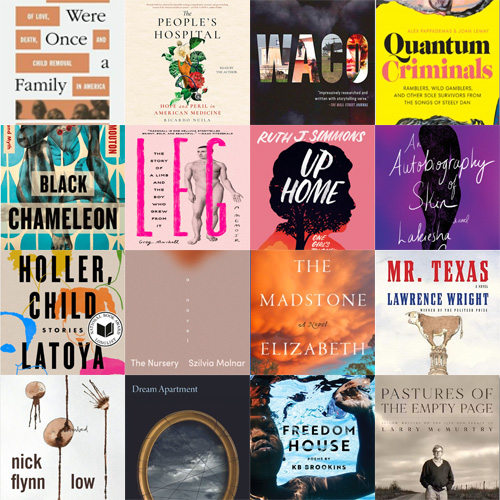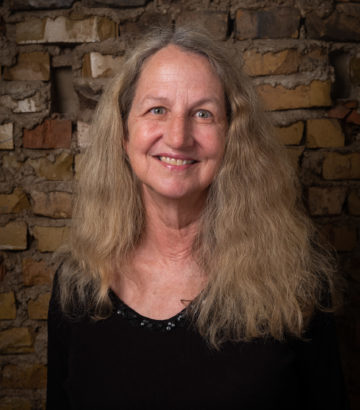
The Texas Observer’s 2023 Must-Read Lone Star Books
From poetic dreamworlds to the people’s hospital, Texas authors paint very different portraits of our diverse state.

Above: A collage of staff favorites by Texas authors in 2023
Despite a disturbing rise in book bans, Texas is, against all odds, becoming more and more of a literary hub with authors winning accolades, indie bookstores popping up from Galveston Island to El Paso, and ban-busting librarians and other book-lovers throwing festivals. So as you ponder gifts this holiday season or consider what to read by the fire or by the pool (who can say in December?), pick some Lone Star lit.
Here’s a list of #MustRead 2023 books by Texans or about Texas compiled by the Observer staff with help from Susan Post of Austin’s independent Bookwoman. (Several talented Texans also made best book lists in Slate magazine, The New Yorker, and NPR’s Books We Love.)
Nonfiction
We Were Once a Family: A Story of Love, Death, and Child Removal in America by Dallas journalist Roxanna Asgarian (Farrar, Straus & Giroux) is a dramatic takedown of the Texas foster care and family court system. It’s both a compelling narrative and an investigative tour de force.
The People’s Hospital: Hope and Peril in American Medicine (Simon & Schuster) by Ricardo Nuila, a Houston physician and author, is an eye-opening and surprisingly optimistic read. Nuila delves deeply into what’s wrong with modern medicine by painting rich portraits of the patients he’s treated (and befriended) while working at Harris County’s Ben Taub Hospital, which offers free or low-cost—yet high-quality—care against all odds. Each of them had been forced into impossible positions and suffered additional trauma from obstacles and gaps in insurance, corporate medicine, and Big Pharma.
Waco: David Koresh, the Branch Davidians and a Legacy of Rage (Simon & Schuster) by Fort Worth journalist Jeff Guinn is one of two books that mark the 30th anniversary of the standoff between the Branch Davidians and federal agents that ended with 86 deaths. (The other is Waco Rising by Kevin Cook.) Both authors recount how the 1993 tragedy shaped other extremist leaders in America—and still influences separatist movements today.
Quantum Criminals: Ramblers, Wild Gamblers and Other Sole Survivors from the Songs of Steely Dan (University of Texas Press) by Alex Pappademas and Joan LeMay has been described as the quintessential Steely Dan book. As part of the project, LeMay, a native Houstonian, created 109 whimsical portraits of characters that sprang from the musicians’ lyrics and legends. In a review, fellow artist Melissa Messer wrote: “Looking at Joan’s oeuvre makes me feel tipsy, or like I’ve drunk Wonka’s Fizzy Lifting Drink and I’m swimming through the air after her, searching for the same vision.”
Memoir
Black Cameleon: Memory, Womanhood and Myth (Macmillan) by Debra D.E.E.P. Mouton, the former Houston poet Laureate, shares lyrical memories of her own life mixed with ample asides on Black culture and family lore. Her storylines sink deeply into a dream world, and yet readers emerge without forgetting her deeper messages.
Leg: The Story of a Limb and a Boy Who Grew from It (Abrams Books) by Greg Marshall of Austin has been described as “a hilarious and poignant memoir grappling with family, disability, and coming of age in two closets—as a gay man and as a man living with cerebral palsy.” NPR’s Scott Simon, who interviewed Marshall, described the memoir as “intimate, and I mean that in all ways—insightful and often laugh-out-loud funny.”
Up Home: One Girl’s Journey (Penguin Random House) by Ruth J. Simmons is a powerful memoir from the Grapeland native who became the president of Brown University and thus, the first Black president of an Ivy League institution. Simmons begins by sharing stories about her parents, who were sharecroppers, and about her life as one of 12 children growing up in a tiny Texas town during the Jim Crow era. For her, the classroom became “a place of brilliant light unlike any our homes afforded.” (Simmons’s other academic credentials include being the former president of Smith College; president of Prairie View A&M University, Texas’s oldest HBCU; and the former vice provost of Princeton.)
Novels and Short Stories
An Autobiography of Skin (Penguin Random House) by Lakiesha Carr weaves together three powerful narratives all featuring Black women from Texas. Carr, a journalist originally from East Texas, plumbs the depths of each character’s struggles, sharing tales of gambling, lost love, abuse, and the power of women to overcome.
Holler, Child (Penguin Random House), a new short story collection from Latoya Watkins, was long-listed for the National Book Award. Her eleven tales press “at the bruises of guilt, love, and circumstance,” as the cover description promises, and introduce West Texas-inspired characters irrevocably shaped by place.
The Nursery (Pantheon Books) by Szilvia Molnar—a surprisingly honest, anatomically accurate (and unsettling) novel about new motherhood—begins: “I used to be a translator and now I am a milk bar.” It’s a riveting and original debut by Molnar, who is originally from Budapest, was raised in Sweden, and now lives in Austin.
Two legendary Austin writers weighed in with new novels on our tall stack of Texas goodreads: The Madstone (Little, Brown and Company) by Elizabeth Crook, the 2023 Texas Writer Award winner, and Mr. Texas, a fictional send-up of Texas politics by Pulitzer Prize-winning author Lawrence Wright.
Poetry
Bookwoman’s Susan Post, who contributed titles to our list, also recommends filling your holiday shelves with poetry by and about Texans:
Dream Apartment (Copper Canyon Press) by Lisa Olstein;
Low (Gray Wolf Press) by Nick Flynn;
Freedom House by KB Brookins (published by Dallas’ Deep Vellum Bookstore & Publishing Co.)
Essays
Pastures of the Empty Page: Fellow Writers on the Life and Legacy of Larry McMurtry (University of Texas Press) edited by George Getchow, contains essays from a who’s who list of Texas writers about Larry McMurtry’s influence on Texas culture and their lives. It includes an array of reflections on history and the writing process as well as anecdotes about McMurtry’s off-beat and innovative life.
To Name the Bigger Lie (Simon & Schuster) by Sarah Viren, an ex-Texan who now teaches creative writing at Arizona State University, (excerpted in Lithub) includes reflections on Viren’s experiences (and misadventures) as an “out” academic and writer in states like Florida, Texas, and Arizona. As she dryly notes, “Critiques of the personal essay, and by extension memoir, are often gendered—not to mention classist and racist and homophobic.”


